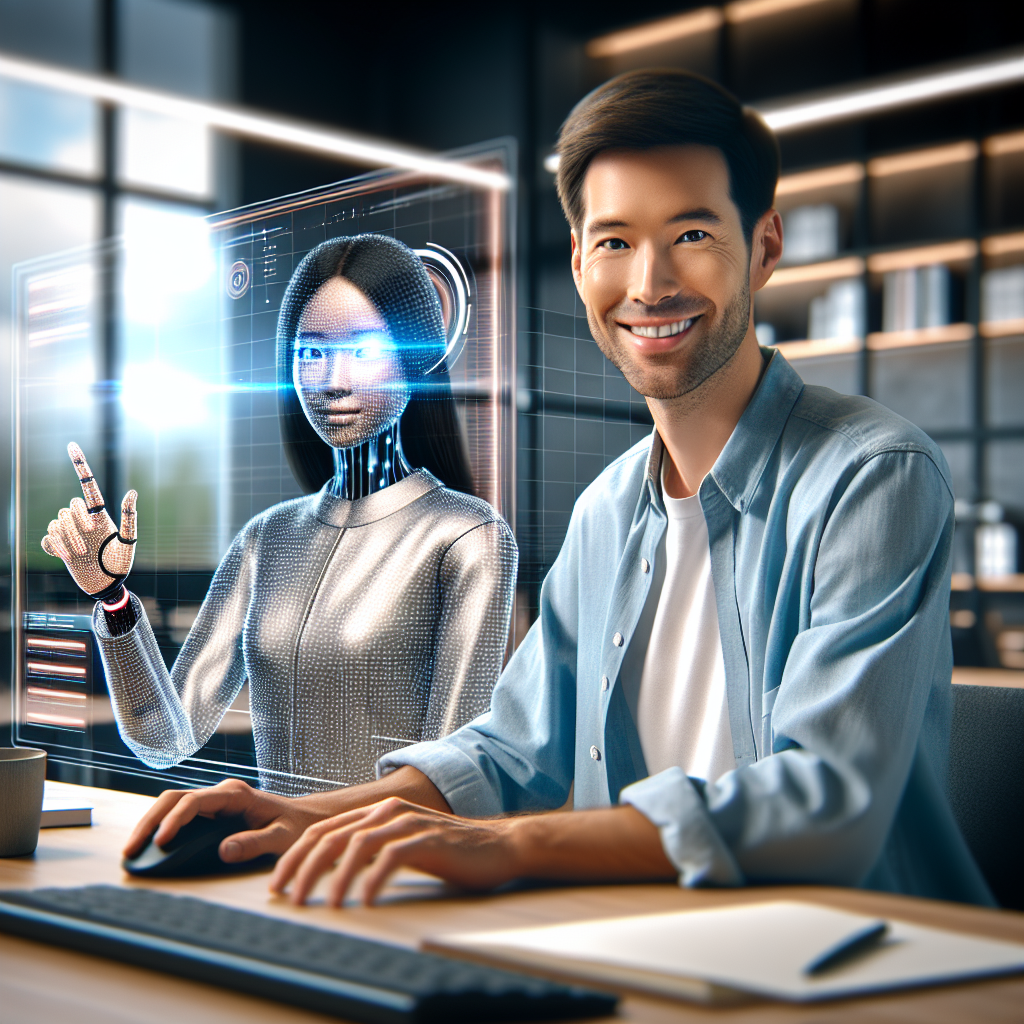Have you noticed the quiet revolution happening in your digital workspace? While we’ve been busy adjusting to remote work and cloud services, AI agents have been silently reshaping the foundation of how businesses operate. These aren’t just souped-up chatbots or simple automation tools – they’re autonomous digital workers that are fundamentally changing how entrepreneurs, small businesses, and developers approach their daily tasks.
Unlike traditional software that waits for your commands, AI agents on modern AI SaaS creation platforms are proactively getting work done behind the scenes. They’re scheduling meetings, drafting emails, analyzing data, and even making decisions – all while you focus on the creative aspects of growing your business.
The Rise of Autonomous Digital Workers
AI agents represent the next evolutionary step in software as a service (SaaS). They bring a level of autonomy and intelligence that transforms them from passive tools into active contributors to your workflow. For the small business owner juggling multiple roles or the solo entrepreneur with limited resources, these AI digital workers are becoming indispensable team members.
“AI agents are emerging as transformative tools poised to redefine how SaaS platforms operate, deliver value, and interact with users,”
notes a recent industry analysis. This transformation isn’t happening through flashy product launches but through the quiet integration of AI capabilities that solve real problems for users.
What makes these AI agents particularly powerful is their ability to learn and adapt. Unlike traditional software that requires constant updates and reconfiguration, customizable AI digital workers can observe your patterns, adapt to your preferences, and continually improve their performance – creating a truly personalized experience that traditional SaaS can’t match.
Key Features Empowering Users Without Technical Skills
The real game-changer in the AI SaaS creation platform landscape is how user-friendly AI tools have become. The technical barriers that once made advanced technology inaccessible to non-developers are rapidly disappearing. Today’s customizable AI digital workers come with intuitive interfaces that allow anyone – regardless of their technical background – to configure and deploy powerful AI solutions.
For individual entrepreneurs and small team companies, this democratization of technology is revolutionary. Key features driving this transformation include:
Autonomous operation: AI agents can work independently, making decisions and completing tasks without constant supervision. They can send follow-up emails, qualify leads, and even handle customer inquiries without human intervention.
User-friendly design: Modern AI tools prioritize intuitive interfaces over complex programming requirements. Drag-and-drop builders and visual workflow designers make it possible to create sophisticated systems without writing a single line of code.
Customization without coding: Users can tailor AI digital workers to their specific business needs through simple configuration rather than complex development. This allows entrepreneurs to create custom solutions for their unique challenges.
Integration capabilities: AI agents can connect with existing tools and platforms, creating a seamless ecosystem that enhances rather than replaces current workflows.
For example, Decision AI, an autonomous AI agent, “makes automated decisions based on hundreds of data points, allowing it to automate up to 97% of business knowledge work.” This level of automation was once the exclusive domain of enterprise-level organizations with massive IT budgets but is now accessible to businesses of all sizes.
Transforming SaaS Creation Through Intelligence
The impact of AI agents on SaaS creation platforms goes beyond simple automation. We’re witnessing a fundamental shift toward self-optimizing applications that continuously improve based on usage patterns and feedback. This aligns perfectly with Zygote.AI’s philosophy of making innovation accessible without requiring advanced coding skills.
AI-powered low-code platforms are dramatically reducing the time and expertise needed to create powerful business applications. According to Gartner, “70% of newly created apps will rely on low-code/no-code tools by 2025, nearly tripling the rate of development since 2020.” This acceleration is largely driven by the integration of AI capabilities into development platforms.
For developers and technical professionals, this doesn’t mean obsolescence – it means elevation. Rather than spending hours on repetitive coding tasks, they can focus on solving complex problems and adding unique value. As one developer put it,
The productivity gains are substantial. Research shows that
“98% of tech leaders reported development time savings with low-code and no-code solutions — with nearly four out of five companies (78%) saving up to 50% of development time.”
These efficiency improvements translate directly to faster innovation and competitive advantage.
At Zygote.AI, we’ve embraced this vision by creating an AI SaaS creation platform that enables anyone to turn their ideas into functional AI applications without specialized knowledge. Our approach recognizes that innovation shouldn’t be limited to those with technical expertise – great ideas can come from anywhere, and our platform makes them actionable.
Intelligent Collaboration and Workflow Automation
Perhaps the most profound impact of AI agents is how they’re transforming collaboration within organizations. Traditional workflow automation focused on simple, rule-based processes. Today’s AI-powered systems bring intelligence to collaboration, understanding context, learning from interactions, and adapting to changing conditions.
AI agents excel at handling routine tasks that typically consume valuable human time. They can:
- Schedule and coordinate meetings across time zones
- Summarize lengthy email threads and documents
- Draft responses to common customer inquiries
- Monitor systems and alert team members to potential issues
- Collect and analyze data to identify trends and opportunities
This intelligent collaboration creates a multiplier effect for teams. When AI handles the predictable and repetitive aspects of work, human team members can focus on creative problem-solving, relationship building, and strategic thinking – areas where human intelligence still far surpasses artificial alternatives.
For small businesses and startups with limited resources, AI agents effectively expand the team’s capabilities without expanding headcount. As one entrepreneur noted,
“My AI workflow automation system does the work of at least two full-time employees, but without the overhead costs.”
The integration possibilities are expanding rapidly. “There are many options for creating Agentic AI workflows. The low-code options include LM Studio, n8n, and Flowise Cloud. Lots of integrations,” reports one industry analyst. These tools make it possible to create sophisticated workflows that connect disparate systems and automate complex processes.
Market Trends: The Future of AI SaaS by 2025
Looking ahead to 2025, several clear trends are emerging in the AI SaaS creation platform landscape:
Accelerated adoption of low-code development: As mentioned earlier, Gartner predicts that 70% of new applications will be developed using low-code or no-code technologies by 2025. This shift is being driven by both the shortage of skilled developers and the increasing sophistication of low-code platforms.
Democratization of AI technology: Advanced AI capabilities are becoming accessible to non-technical users. “With AI and low-code, organizations can bring non-developers into the development process so they can help create apps and innovate alongside their developer colleagues,” explains one industry expert.
Vertical AI agents: Rather than general-purpose AI, we’re seeing the rise of specialized agents designed for specific industries or functions. “Vertical AI agents are specialized AI systems designed to handle specific tasks or workflows in a single domain,” making them highly effective at solving domain-specific problems.
Cost reduction through AI adoption: The economic benefits are becoming clear. “Nearly two-thirds (62%) of companies that use low-code tools have reduced overall development costs, with 67% unlocking cost reductions of up to 30%.” These savings allow businesses to invest more in innovation and growth.
Rise of AI marketplaces: Platforms that allow users to share and sell their AI creations are gaining traction. This aligns with Zygote.AI’s vision of an open market for personal use AI products, where innovations can be shared and monetized.
The convergence of these trends points to a future where AI SaaS creation becomes increasingly accessible, powerful, and economically attractive for businesses of all sizes. As one observer put it,
“The combination of low-code and generative AI will increase productivity by automating routine tasks. This allows developers to focus on complex logic and innovation.”
The New Era of Productivity and Innovation
The integration of AI agents into SaaS platforms represents more than just another technological advancement – it signifies a fundamental shift in how we approach work and innovation. By handling routine tasks autonomously and enabling non-technical users to create sophisticated applications, AI agents are expanding what’s possible for entrepreneurs, small businesses, and developers.
This vision aligns perfectly with Zygote.AI’s mission to empower individuals and foster continuous innovation. Our ultimate goal is to achieve fully automated workflows that require minimal human intervention – a vision we’re already realizing with workflows that can autonomously select topics, write content, generate illustrations, perform reviews, and publish promotional articles.
For individual entrepreneurs juggling multiple responsibilities, AI agents provide much-needed support without the overhead of additional staff. For small team companies looking to scale their impact, customizable AI digital workers extend capabilities beyond what traditional hiring would allow. And for developers and technical professionals, user-friendly AI tools free up time for creative problem-solving and innovation.
The silent revolution of AI agents is creating a more accessible, productive, and innovative future. As these technologies continue to evolve and integrate into our daily workflows, we’ll look back and wonder how we ever managed without our autonomous digital colleagues. The future of work isn’t just automated – it’s intelligently augmented through the partnership between human creativity and AI capabilities.
The question isn’t whether AI agents will change how we work – they already are. The real question is how quickly you’ll embrace these tools to transform your own workflow, boost your productivity, and unlock new possibilities for innovation in your business.









